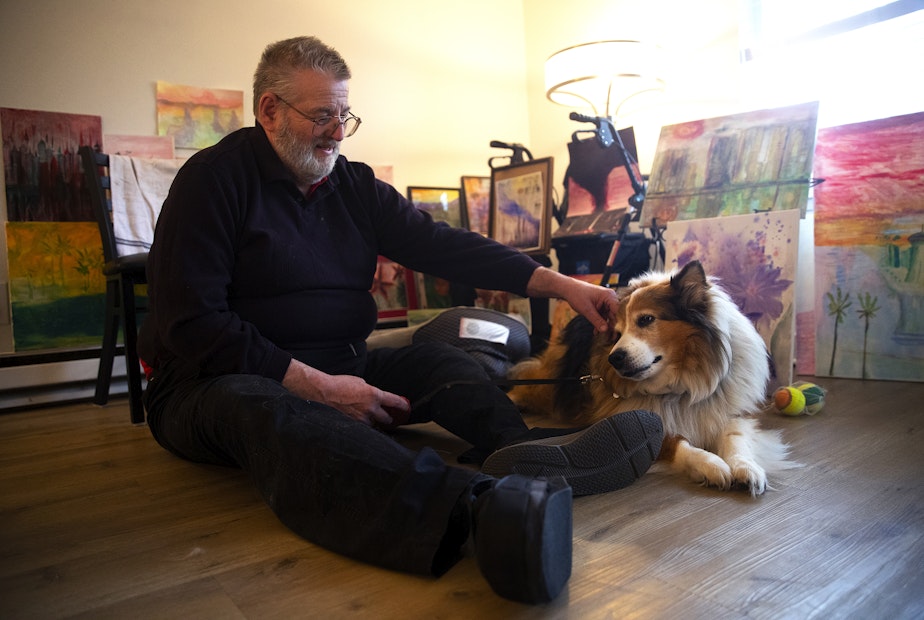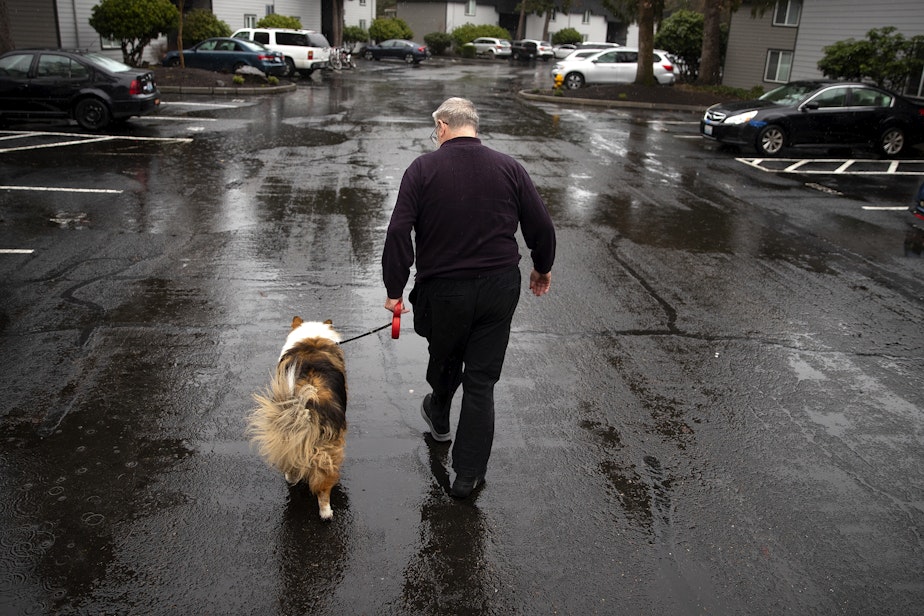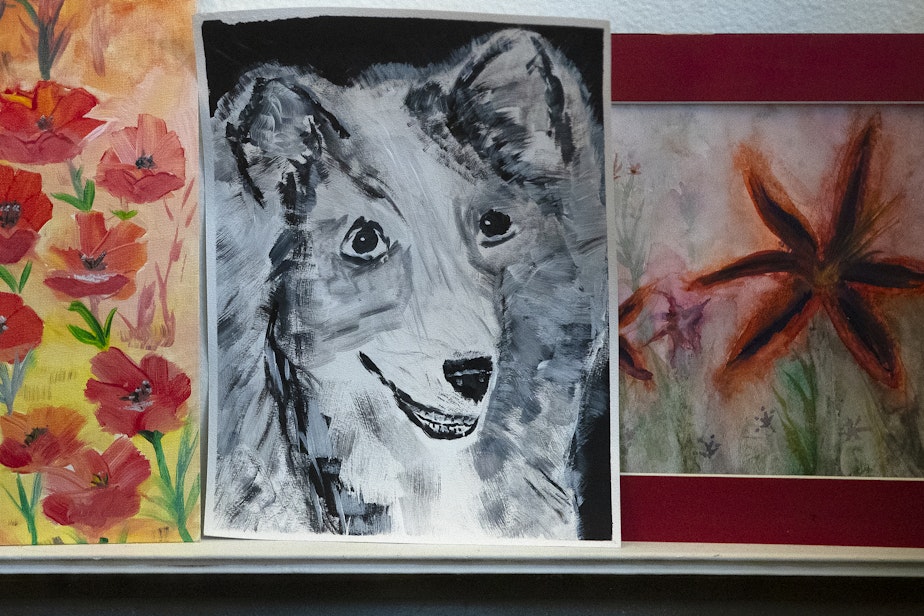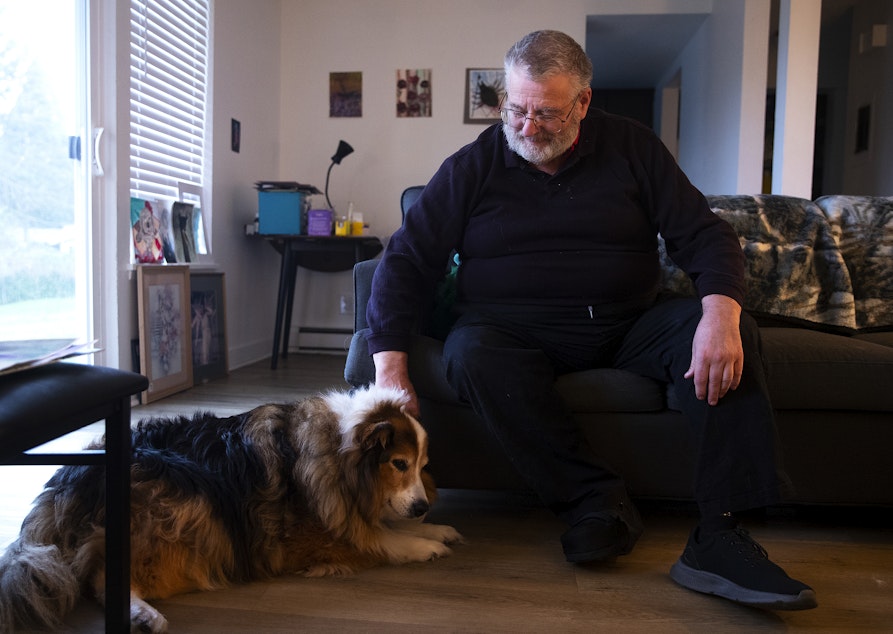In dire times, Seattle area pet owners turn to local foster care program

Unexpected emergencies can cause major disruptions, like leaving someone unable to take care of a beloved pet. But there's help available in the Seattle area.
Before you even knock on Ned Beck's door, you can hear the barking. Beck opens his door a crack and a very large — and very hairy — collie is waiting.
This is Bud, and he loves Beck.
“Follows me everywhere I go — I can't move around in here without him being right next to me,” Beck says, looking down lovingly at the dog. “He's like Velcro.”
It makes sense why Bud won’t leave Beck’s side: The 12-year-old canine has been with Beck since he was just a few weeks old.
They’ve never been apart. Their favorite routine is a daily walk through the woods.
"He used to have no problem going for a couple mile walk,” Beck says.
But a few years ago, Beck got really sick — a bad infection in his leg. He needed surgery, rehab, and physical therapy.
And those walks with Bud stopped.

"I couldn't take care of Bud, and I didn't have anybody that I would trust because it was going to be a couple months that I wasn't going to be able to do anything,” he says.
That's when a friend told him about Seattle Humane, an animal shelter in Bellevue. Its staff help people like Beck who have pets and suddenly need help during an emergency.
"People are in crisis so they usually need immediate services, either in the next couple of days or sometimes the same day,” says McKenzie Alexander, the shelter's intake manager. “If a person is really in crisis then oftentimes they will just show up at the shelter."
After about a week at Seattle Humane, Bud was paired with a foster family. He lived with them for four months while Beck was recovering.
This fostering program at Seattle Humane, called Support for Pet Owners (SPOT), is only a few years old. Alexander says it started when people without stable housing would show up to the shelter unsure about what to do with their pets.
"There's been a pretty dramatic increase in the last couple of years with the housing crisis and the economic crisis that we're facing right now," she says. "A lot of owners are seeking both surrender and temporary foster."

People are forced to foster their pets for a range of reasons. Oftentimes, they're in between housing or the place they're moving into doesn't allow pets.
One such person is Los Paz, a resident of Burien. He had a cat named Ash — until he became homeless.
"That was pretty much my daughter and I love that cat,” Paz says outside of his tent. “My ex-wife took her to have her inside and whatnot. She moved away but...that was my baby. I miss her — I miss her dearly."
Seattle Humane's SPOT foster program has room for about 30 animals at a time and there's currently a waiting list. Alexander says they try to foster the pets for as long as an owner needs.
"Overwhelmingly, it is like one of the hardest decisions of people's lives and they really, a lot of times, are seeking shelter as the very last option,” she says. “They’re really in a kind of a desperate situation."
Beck says it was a huge relief knowing that Bud was safe while he was in the hospital.
“They were there when I needed them,” he says about the SPOT program.

Beck ended up losing his left foot due to his infection. He had to learn to live with a prosthetic.
And he did that quickly, thanks to one goal motivating him: "I wanted to walk Bud,” he says.
After four months separated, Beck walked into the shelter to meet Bud's foster family and take him home.
"Their whole family — kids and everything — came to say goodbye to Bud,” Beck says while beginning to tear up. “And they were sort of disappointed, I think, because as soon as I got there, he sort of chose to be with me. He didn't really say goodbye good."
Beck says he sends the family photos and updates of Bud, just like they used to do for him.
He jokes that the two of them may be a little slower now, but they always get their daily walk in.




